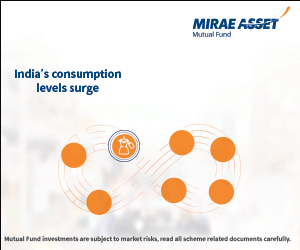Be careful and manage your finances smartly

The last fifteen sixteen months have been very eventful for India as a new Government came in power with a clear majority which prompted the stock market to take a new high. The two budgets presented by the new Government are all about hope for the common man with thrust on social security and higher domestic savings. Even though we had high inflation, the economy looks better under the new leadership. All around there is hope, talk about growth and India becoming an economic super power. Thanks to the demographic, we as a country emerged as the youngest and certainly moving into a high growth trajectory. While all these may take some time to reflect in tangible benefits for the nation in particular and the common man in general, there are few financial things, if managed smartly can multiply your benefits further and lead you to a happy and relaxed life.
Deal with your finances efficiently
Our lives are constantly hounded by choices. More choices lead to higher aspirations resulting in varied financial choices. These lead to owing more than one credit card, EMIs, home and personal loans which require constant supervision. It is essential that you keep track of these details. The deadlines for various payments must be kept under constant vigilance. Once you lose track you will be paying high rate of interest and delinquency fees along with the balance due. For example – interest rate in a delay in credit card payment could be as high as 24% - 36%.
However, these are easily avoidable expenses with a little vigil. Along with these expenses, if you are also investing, it is essential that your bank account must have adequate balance so that the auto debits, EMIs etc. are honoured and paid in time. These timely payments will ensure you get higher returns on your investments. For example, if you are investing in PPF and you make the monthly investment before the 5th of the month you earn interest for that month and no interest if invested after 5th. These little considerations will ensure you get the most out of your investments. A timely auto debit of your SIP ECS ensures you do not pay bank charges on rejection of the auto debit
Review and rebalance your investments
We start our career with certain goals in mind. Therefore, it is necessary that we review these goals regularly and check the progress. As an investor are you satisfied? Please analyze the performance of your investments. An investment, if fails to perform as estimated then the goal might remain underfunded. The total corpus required for the fulfillment of the goal may have increased due to unavoidable factors like inflation. To avoid such a situation an investor needs to decide if any further investments need to be made.
Reviewing and rebalancing the portfolio is the key to achieving your financial goals. In FY 2014-15 fixed income return was around 9%, gold fell by more than 5% and equity delivered around 35-40% return. Due to these changes in the market, rebalancing the portfolio becomes crucial. Check how the investments for various goals have progressed and if they met the returns that were expected. Investors along with their financial planners must set goals that the investments should achieve in the years to come.
Spend but within a budget
Prioritize your sending and do not be extravagant. Keep track of where you are spending on a regular basis to ensure that your money is being spent for the right reasons. You know your financial capabilities, having a budget may help you to draw a line. It is important that you create a contingency fund as safety net during financial crisis. Being on a budget does not imply you will have to be hard on yourself. It means you have to make financial choices depending on the degree of importance and the purpose it serves.
Focus on your Tax Planning
Tax planning is not an activity that can be hurriedly carried out in the last month of the financial year. It should be conducted in a manner that it gives you the double benefit of earning returns and saving taxes. The National pension Scheme (NPS) launched by the Government of India now allows tax exemption on investment of 50,000 under Section 80CCD(1B). Starting early could also lead to an early retirement. If your investments grow enough to ensure a handsome income you do not even have to work till 60, unless you want to.
The Demonic Debts
Global economic crisis have often been caused due to heavy reliance on debts. This remains unchanged for personal finance as well. Having too much debt burden, like Home Loan EMIs, Credit Card installments and any kind of kind for self indulgence can be deadly. Debt and plastic money is easily available these days, For example – these days you can buy a pair of jeans or buy a new hand set or a tablet on EMI. Do not make these kind of affordability a way of life. It will create a bubble of debts where new debts are created to repay the old debts. Remember, these debts are costly and if not paid off in time can create serious problem for you. Even if you can financially afford the monthly payments, you must avoid these debts. Having a debt free lifestyle and earn extra return on your monthly surpluses is the best thins one can have.
Save enough for your retirement
It is never too early to start planning for your retirement. Do not let your early years deter you from planning for your retirement. It would be beneficial if you could avail the tax benefit of 50,000 under Section 80CCD(1B) by investing in The National Pension Scheme (NPS). You will retire one day and you will need the same income to maintain your current lifestyle. Starting early could also lead to an early retirement. If your investments grow enough to ensure a handsome income you do not even have to work till 60, unless you want to.
The silly mistakes should not be the expensive Ones
Most people tend to borrow from their future income like yearly bonus or festival advance or their provident fund balance. They resort to credit cards to borrow or withdraw money against these foreseeable incomes. It is advisable to first pay the outstanding debts, if you have any, from these amounts and save the interest. It is advisable to save the surplus in a new investment or just put it in a liquid fund to earn more than your savings bank account.
How well are you covered
There are broadly three kinds of coverage: Life insurance, health insurance and property & casualty insurance. The life insurance cover an individual requires keeps on changing. The cover that was sufficient ten years ago is not sufficient to cover a life today. The cover needs to be increased or decreased depending on the circumstances that surround you and also your income levels. If you are shifting from being employed to self employed it is advisable to increase you life insurance. The cover that was probably provided by your employer will not be applicable anymore. The same applies for health insurance. As an investor you need to ensure that you have a policy that covers you and your family from any major health calamity that might befall you.
Other than automobile insurance, which is mandatory, property & casualty insurance is one of the most underestimated insurance in India. Property and casualty insurance covers the insured against the losses to their property (home, automobile and business) and against legal liability arising out of causing injury or damage to someone else or their property. Insured can also get protection from natural calamities like earthquakes, tsunamis, cyclones, volcanoes etc. The importance of property and casualty insurance has been glaringly important because of the recent natural calamity that hit Nepal and parts of Eastern India. Insurance against theft, fire and any other natural calamity may seem farfetched but one understands its importance only when it occurs. The premium paid every month is minimal for these insurance but you get what you need most: security.
Choose Equity over conventional savings schemes
When planning your investment, you should always factor in the impact of taxes and inflation. The post tax return of conventional fixed income savings schemes can barely keep up with inflation in the long run. Equity as an asset class has beaten inflation consistently, in terms of post tax returns, over a long investment horizon. Capital gains from equity shares and equity funds, held over a period of one year, are entirely tax free, as are dividends in the hands of the investor. Interest earned from most fixed income investments, on the other hand, are taxed as per the income tax rate of the investors. As far as tax-saving investments (Section 80 C) are concerned, Equity Linked Savings Scheme is simply the best investment choice for younger investors. As per our research, an average ELSS fund, would have beaten the total returns of Public Provident Fund, by as much as 4 times, over the total tenure of the investment from FY 2001 – 2015 (for more details please refer to our article, Why is ELSS the simply best tax saving investment for young investors)
Expect but not too much too early
Miracles are not performed in a day and money is not doubled overnight. While it is natural to have expectations but do not have unrealistic ones. Any form of investment requires patience and constant vigil on the amount invested. There are many stocks that have generated over 100% returns in last one year. However, to expect these kinds of returns perpetually could be fatal to the investment. Unrealistic assumptions and expectations could be fatal. Dream big but be grounded in your expectations and remain invested for the long haul and benefit from power of compounding.
Queries
-
What is the benefit of mutual fund STP
Aug 29, 2019
-
How much to invest to meet target amount of Rs 2 Crores
Aug 26, 2019
-
Can I achieve my financial goals with my current mutual fund investments
Aug 24, 2019
-
Can you tell me return of various indices
Aug 19, 2019
-
What would be the post tax return on different investments
Aug 18, 2019
-
Which Principal Mutual Fund scheme will be suitable for my retirement corpus
Aug 16, 2019
-
What is the minimum holding period for availing NCD interest
Aug 4, 2019
Top Performing Mutual Funds
Recommended Reading
Fund News
-
RBI Monetary Policy: RBI changes policy stance and lowers rate
Apr 9, 2025 by Axis Mutual Fund
-
Kotak Mahindra Mutual Fund launches Kotak Nifty Top 10 Equal Weight Index Fund
Apr 7, 2025 by Advisorkhoj Team
-
Reciprocal Tariffs: Casting a wider net
Apr 7, 2025 by Axis Mutual Fund
-
Kotak Mahindra Mutual Fund launches Kotak Energy Opportunities Fund
Apr 3, 2025 by Advisorkhoj Team
-
Groww Mutual Fund launches Groww Nifty 500 Momentum 50 ETF FOF
Apr 3, 2025 by Advisorkhoj Team













